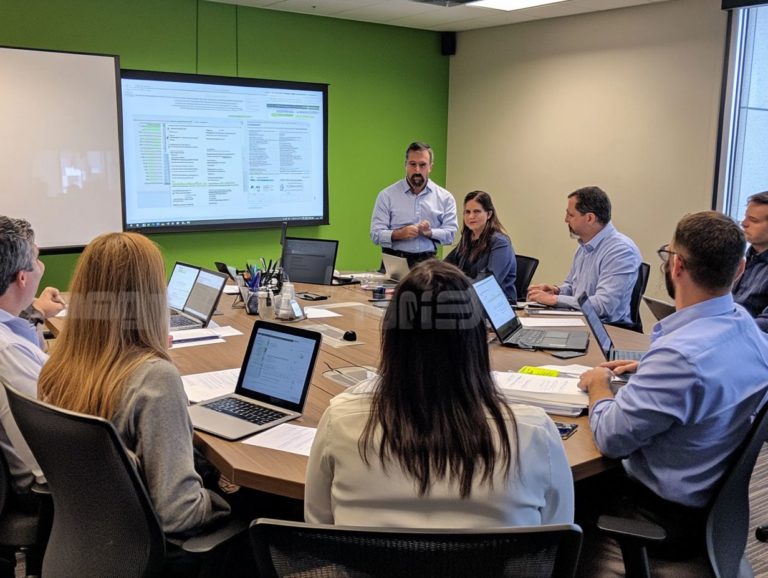“Building a CRM Training Schedule: Best Practices”
In today s competitive landscape, mastering effective Customer Relationship Management (CRM) is vital for your business’s success.
A well-structured CRM training schedule can dramatically enhance productivity, streamline processes, and build lasting relationships with your customers.
This article delves into the myriad benefits of implementing a CRM training program, provides guidance on designing a successful schedule tailored to your organization’s unique needs, and highlights best practices to ensure that your training is both effective and sustainable.
Explore the insights within to elevate your CRM approach and create a lasting impact.
Contents
- Key Takeaways:
- Benefits of Implementing a CRM Training Schedule
- Designing a Successful CRM Training Schedule
- Best Practices for Creating a CRM Training Schedule
- Frequently Asked Questions
- What is the purpose of building a CRM training schedule?
- What are the key elements to consider when building a CRM training schedule?
- How often should a CRM training schedule be updated?
- What are the best practices for delivering CRM training?
- How can employees be motivated to participate in CRM training?
- What is the role of managers in implementing a CRM training schedule?
Key Takeaways:
A CRM training schedule offers many benefits, leading to improved productivity and better customer relationship management, ultimately benefiting the overall success of a business.
A successful CRM training schedule involves identifying training needs, setting specific goals and objectives, and determining appropriate training methods.
To create an effective CRM training schedule, it is important to establish a timeline, incorporate feedback and assessment, and ensure adequate resources and support for trainees.
What is CRM Training?
CRM training is an essential journey designed to elevate your skills and knowledge in customer relationship management. It focuses on equipping you with the necessary tools and practices to navigate CRM software effectively, develop engaging customer strategies, and enhance overall service performance.
Through structured training programs, you ll dive into various processes, best practices, and data management techniques that are crucial for optimizing customer interactions and driving business growth. This training is a game-changer for professionals in every industry including marketing, sales, and customer support teams who rely on powerful systems like Salesforce or Dynamics 365 to manage customer data efficiently.
The curriculum typically covers modules on:
- User interface navigation
- Ensuring data entry accuracy
- Interpreting analytics
- Leveraging automation features that streamline workflows
You will gain invaluable insights into crafting personalized customer experiences, building lasting relationships, and encouraging teamwork within your organization.
By investing in CRM training, you position yourself and your team to meet the ever-evolving demands of customer service, ultimately enhancing loyalty and boosting revenue.
Benefits of Implementing a CRM Training Schedule
A CRM training schedule offers many benefits, enhancing productivity, efficiency, and customer satisfaction across your teams.
A structured training program empowers your employees with the skills and knowledge needed to utilize CRM systems effectively. This leads to more streamlined workflows and improved data management, fostering stronger relationships with your customers.
The result? Increased ROI and adherence to industry standards, positioning your organization for success.
Improved Productivity and Efficiency
One of the standout benefits of CRM training is the remarkable boost in productivity and efficiency you can expect afterward. This enhancement largely stems from a more strategic use of CRM tools, giving you the power to manage customer interactions and data effortlessly.
When your teams are well-trained, they can automate tedious workflows, cutting down on manual errors and saving precious time. In fact, studies suggest that businesses can experience up to a 30% increase in efficiency.
Streamlined processes pave the way for better collaboration among team members, enabling quicker decision-making. Metrics reveal that trained employees harness 40% more features of their CRM system, leading to improved sales conversions and higher customer satisfaction rates.
Better Customer Relationship Management
Effective CRM training can transform your approach to customer relationship management by equipping you with the tools to engage clients in a more meaningful way.
This comprehensive training ensures that you and your team understand how to use CRM tools effectively. It allows you to track interactions and personalize your communication seamlessly.
For example, by mastering the art of segmenting customer data, you can tailor your outreach strategies. This leads to richer and more effective customer interactions.
Companies that invest in robust CRM training often see impressive increases in customer satisfaction scores and retention rates. As employees become adept at addressing customer needs and responding to inquiries promptly, they enhance your overall service quality.
This training shows why gathering and analyzing customer feedback is important, giving you the power to continuously refine your approaches.
Designing a Successful CRM Training Schedule
Designing a successful CRM training schedule demands a deep understanding of your organization s needs, training objectives, and the resources at your disposal all tailored to elevate team performance.
By identifying key areas for growth and necessary skills, you can craft a structured approach that helps with learning and keeps people engaged.
A thoughtfully organized schedule should incorporate a variety of techniques, such as workshops, e-learning courses, and hands-on sessions. This ensures that participants gain practical insights while adhering to best practices in customer relationship management.
Identifying Training Needs
Identifying your training needs is the essential first step in crafting a CRM training schedule that resonates with the specific skills and gaps within your team.
To accurately gauge these requirements, you can employ various evaluation techniques, such as skill assessments, performance reviews, and surveys.
By gathering feedback through structured interviews and anonymous questionnaires, you ll uncover invaluable insights into the strengths and weaknesses of your team members. Tools like competency matrices can help identify specific skill deficits, paving the way for tailored training solutions.
Engaging with industry benchmarks and best practices will further enhance your ability to customize training initiatives, effectively addressing any gaps.
This ultimately cultivates a proficient and confident team ready to excel in their roles.
Setting Goals and Objectives
Setting clear goals and objectives within your CRM training schedule is essential for measuring its effectiveness and ensuring it aligns with your business outcomes.
By employing the SMART framework, you can significantly enhance your training strategies.
For example, a specific goal might be to boost your sales team s proficiency in the CRM software by conducting three comprehensive training sessions over the next quarter.
You can measure this progress by tracking improvements in their ability to input customer data accurately and analyze sales trends, aiming for at least a 20% increase in data accuracy.
Achievability is equally important; setting a target that matches your team s current skill level keeps the training relevant and engaging.
Focusing on real metrics can reveal success, such as a noticeable uptick in customer satisfaction ratings following the training. This shows that investing in skills really pays off!
Determining Training Methods
Determining the right training methods is essential to maximize engagement and enhance learning outcomes within your CRM training schedule.
You can use various approaches to achieve this objective, including:
- e-learning platforms
- engaging workshops
- hands-on on-the-job training
- personalized mentorship programs
E-learning platforms provide flexibility and accessibility, allowing you to progress at your own pace while tapping into a wealth of resources.
Workshops create an interactive environment that fosters collaboration and knowledge sharing among participants.
On-the-job training emphasizes real-world application, enabling you to enhance your practical skills and build confidence in using the CRM system.
Meanwhile, mentorship offers personalized guidance to help you navigate challenges and grow professionally.
Each method has its unique advantages, and when combined strategically, they can lead to a comprehensive training experience that truly elevates your learning journey.
Best Practices for Creating a CRM Training Schedule
Developing a CRM training schedule that integrates best practices is vital for maximizing effectiveness. It provides participants with a smooth and enriching learning experience.
By carefully curating the content and structure, you ensure that every session is not only informative but also engaging. This enables participants to grasp concepts with ease and confidence.
Establishing a Timeline
Establishing a timeline for your CRM training program is essential for effective planning and execution. It ensures that all participants are fully aware of the structure and established expectations.
A well-structured timeline defines the duration of each training session. It also highlights key milestones that must be achieved throughout the process.
Clear checkpoints signal progress and provide opportunities for feedback, keeping everyone aligned and informed. Flexibility is crucial; being able to adapt the timeline in response to unforeseen challenges or changing priorities helps maintain engagement and optimize learning outcomes.
By constantly communicating updates and adjustments, you foster a collaborative atmosphere and a sense of collective responsibility. This ultimately paves the way for the success of your CRM initiative.
Incorporating Feedback and Assessment
Including feedback and assessments in your CRM training schedule is essential for measuring training effectiveness. It helps identify areas for improvement.
You can employ various strategies, such as surveys and informal discussions with participants, to gather insights about their learning experiences. Utilizing quizzes or knowledge checks can further help gauge retention of key concepts.
This allows you to pinpoint areas requiring more focus. Analyzing participant performance data should guide you in refining future sessions.
This iterative approach not only elevates the training curriculum but also ensures that individuals feel engaged and supported throughout their learning journey.
Ensuring Adequate Resources and Support
Ensuring you have adequate resources and support for your CRM training schedule is essential for equipping participants with the tools and materials they need to excel.
Access to comprehensive training materials think user manuals, video tutorials, and case studies is vital for creating an engaging learning environment. Hands-on experience with the CRM software itself is crucial, allowing trainees to practice real-world scenarios and build confidence in their skills.
Don t overlook the importance of ongoing support. Establishing a mentoring system or creating forums for participants to ask questions and share insights will significantly enrich their learning journey.
By integrating these elements, organizations can cultivate proficiency in CRM systems, empowering teams to fully leverage the potential of customer relationship management.
Frequently Asked Questions
Here are some common questions about CRM training schedules.
What is the purpose of building a CRM training schedule?
The purpose of building a CRM training schedule is to ensure that all employees are knowledgeable and proficient in using the CRM system. This will lead to better customer relationships, increased productivity, and improved data management.
What are the key elements to consider when building a CRM training schedule?
Some key elements to consider include identifying the target audience, determining training objectives, selecting appropriate training methods, and setting a realistic timeline.
How often should a CRM training schedule be updated?
A CRM training schedule should be updated regularly, especially when there are changes to the CRM system or processes. It is recommended to review and update the schedule at least once a year to ensure it remains relevant and effective.
What are the best practices for delivering CRM training?
Some best practices for delivering CRM training include providing hands-on training, tailoring the training to the specific needs of employees, offering ongoing support and resources, and incorporating real-life scenarios into the training.
How can employees be motivated to participate in CRM training?
Motivating employees for CRM training starts with highlighting its benefits. Offer incentives and involve them in the planning process to make them feel valued.
Address any concerns or barriers they might have about the training. This shows you care about their needs and helps build trust.
What is the role of managers in implementing a CRM training schedule?
Managers are key to a successful CRM training schedule. They set clear expectations and provide the necessary support and resources.
Accountability is also important. Managers should lead by example and participate in the training, demonstrating its value.






